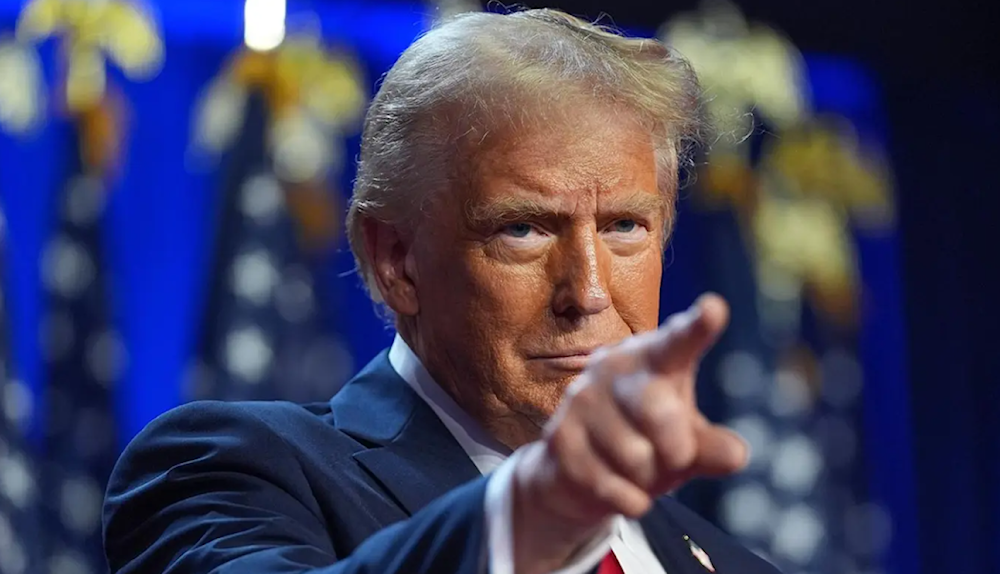Trump says Haley, Pompeo will not join second administration
According to Reuters, Trump spoke with prominent investor Scott Bessent, a likely choice for US Treasury Secretary.
-

President-elect Donald Trump arrives at an Election Night watch party at the Palm Beach Convention Center in West Palm Beach Florida. (AP)
President-elect Donald Trump revealed Saturday that former Republican presidential candidate Nikki Haley and former Secretary of State Mike Pompeo would not be invited to join his government.
"I will not be inviting former Ambassador Nikki Haley, or former Secretary of State Mike Pompeo, to join the Trump Administration, which is currently in formation," Trump wrote on social media.
However, he said that he enjoyed and appreciated working with them in the past and thanked their "service" to the country.
Trump is talking with possible government officials ahead of his January 20 inauguration. According to Reuters, Trump spoke with prominent investor Scott Bessent, a likely choice for US Treasury Secretary.
Haley, a former South Carolina governor who served as Trump's ambassador to the United Nations, backed Trump for president despite her scathing criticism of him during the party primary.
Haley wrote on social media that she was "proud" to formerly work with Trump, "defending America" at the UN, and added that she wished him great success during his upcoming term. It is noteworthy that Haley, a pro-"Israel hawk, was formerly under fire for signing the phrase, “Finish Them!” on artillery shells in a May visit to "Israel's" northern settlements.
Pompeo, who previously served as head of the Central Intelligence Agency under Trump, was mentioned in various media sources as a prospective defense secretary and Republican presidential contender until announcing his decision not to run in April 2023.
In his former term, Trump used social media to make significant personnel announcements.
Separately, Trump announced that the 2025 presidential inauguration will be co-chaired by real estate billionaire and campaign supporter Steve Witkoff and former Senator Kelly Loeffler.
Will Trump’s 2nd term bring change to the US' Middle East strategy?
Trump is focused on assembling a national security team for his second term, aiming to avoid the challenges that marked his first-term appointments, Axios reported.
The news website reported, citing sources close to the process, that Trump plans to appoint businessmen and CEOs to key national security roles, moving away from the reliance on former generals seen during his first term. He is also considering loyalists for prominent Washington positions who align closely with his policy vision.
Trump has repeatedly signaled that one of his top priorities would be negotiating peace between Russia and Ukraine, and he has also indicated that he would like to see the wars in Gaza and Lebanon come to a close by the time he is inaugurated.
However, officials nominated to take these key positions offer no radical change to what has been carried out by successive US administrations with regard to the Middle East.
During his first term, Trump's Middle East policy was overseen by his senior advisor and son-in-law, Jared Kushner, who played a central role in drafting "the Israeli-Palestinian peace plan," which saw no support from any Palestinian faction. On the contrary, Kushner's plots in the Middle East saw unanimous opposition and caused great outrage among Palestinians and the Arab populace.
Although Kushner has said he is not interested in returning to government, the ongoing developments in the region could see him take a cabinet position.
No less of an Israeli regime supporter, Avi Berkowitz, Kushner's protege, could be brought back as part of Trump's Middle East team. Additionally, sources told Axios that David Friedman, who served as US Ambassador to the Israeli regime during Trump's first term, could return to that role. Former officials Jason Greenblatt and Aryeh Lightstone might also rejoin the administration to aid the president in Middle East-related policy.

 4 Min Read
4 Min Read








